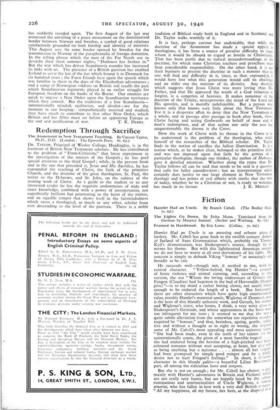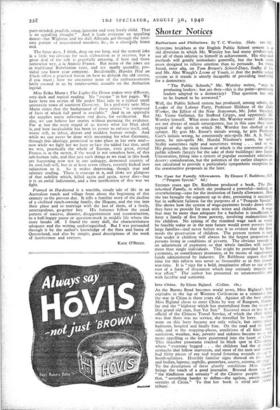Fiction
Hamlet Had an Uncle. By Branch Cabell. (The Bodley Ilea!
7s. 6d.) •
The Lights Go Down. By Erika Mann. Translated from the German by Maurice Samuel. (Seeker and Warburg. 8s. 6d.) Framed in Hardwood. By Eric Lowe. (Collins. 7s. 6d.) Hamlet Had an Uncle is an amusing and urbane piece 0: foolery. Mr. Cabell has gone back to the twelfth century Amlei: of 7utland of Saxo Grammaticus which, probably via Thom, Kyd's dramatisation, was Shakespeare's source, though by no means his theme. But with this lighthearted American mocker we do not have to worry at all over derivations of his fable. His concern is simply to debunk Viking " honour " as amusingly and broadly as he can.
He succeeds well—though not, it seethed to me, with his central character. " Yellow-haired, big Hamlet "—a creature of brute violence and animal cunning, and, according to this version, the son " Whom the loving endeavours of Geruth and Fengon (Claudius) had begotten in the bed of Horvendile (Hamlet pere) "—is to my mind a rather boring clown, not nearly funny enough to be endured the length of a book. But fortunately there are other characters which have quite high entertainment value, notably Hamlet's maternal uncle, Wiglerus of Denmark, who is the hero of this blandly unheroic work, and Geruth, his mother and Wiglerus's sister, who forms, I think, a very witty gloss on Shakespeare's Gertrude, and whose appearances in the book were too infrequent for my taste • it seemed to me that she was a quite subtle alleviation from the somewhat too repetitive murders required by " honour," and that, brainless, ageing, gentle, seduc- tive and without a thought as to right or wrong, she inspired some of Mr. Cab:-.11's most appealing and most universal sa " She had been made, even in the teeth of her talents for the unintentionally comic, the pivot of a most horrible tragedy • • • she had endured being the heroine of a high-pitched and fiery- coloured romance without ever' accepting, at heart, her dire role as being anything but a nuisance . . . . almost all her iniquity had been prompted by simple good temper and by a kindly desire not to hurt Fengon's feelings." In short, a delicious
tire.
character in this bloody galere—a beautiful Lilian Braithwaite part, all among the ridiculous lusts and corpses. But she is not on enough ; for Mr. Cabell has chosen to deal, mainly with Hamlet's adventures in Britain and Pictland, are not really very funny, but are happily laced by the urbane ruminations and sentimentalities of Uncle Wiglerus, a famous amorist, who has fallen in love with a very dull British Prince,ssa. " All my happiness, all my future, lies here, at the disposal
pure-minded, prudish, smug, ignorant and very lovely child. That is an appalling thought." And it leads everyone an appalling dance—but Wiglerus and his dull Alftruda get through the intri- cate patterr ci necessitated murders, &c., to a cheerfully bitter end.
The farce does, I think, drag on too long, and the central joke is a little too obvious for such elaboration as it receives, but a great deal of the talk is gracefully amusing, if here and there somewhat wry, a la Anatole France. But many of the jokes are in traditional Rabelaisian taste, and are neatly quotable, pro- vided you know your company. Incidentally, Hamlet Had an Uncle offers a practical lesson on how to debunk the old stories, if you must ; here we encounter none of the embarrassments lately created in us by tender-comic assaults on the Arthurian legend.
Miss Erika Mann s The Lights Go Down makes very different, very dark and topical reading. No " escape " in her pages. We have here ten stories of life under Nazi rule in a typical small university town of southern Germany. In a prefatory note Miss Mann states that the background of these stories " is composed of facts of which full proof is available." And in an appendix she supplies many references tnd dates, for verification But alas, we can believe her stories without pursuing the evidence. For at last the most stupid of us knows what the Nazi ideal is, and how incalculable has been its power to enforce itself, and, worse still, to infect, distort and madden human minds. And while we can never be done with mourning for what Germany, through this ideology, permitted to take place in her own soul— now while we fight her we have to face the added fact that, until we win, practically the whole of Europe, even great, eternal France, is at the mercy, if the word is not senseless here, of this sub-human rule, and that just such things as we read in this book are happening now not in one unhappy, demented country of its own half-will, but in at least seven others, recently kicked into subjection to it. So it makes depressing, though true and salutary reading. There is courage in it, and the are glimpses of that nobility which, killed again and again, never dies—but it is an awful indictment, and a fine justification of this war we fight.
Framed in Hardwood is a sensible, steady tale of life in an Australian ranch and village from about the beginning of this century to the present day. It tells a familiar story of the decline of a civilised ranch-owning family, the Hogans, and the rise into their place and to marriage with the last of them, of a lively, unscrupulous, go-getter boy. His fortunes follow the usual pattern of success, disaster, disappointment and reconstruction, to a half-happy pause or question-mark in middle life where the story breaks off. I found the story dull, the characterisation adequate and the writing undistinguished. But I was persuaded through it by the author's knowledge of the flora and fauna of Queensland, and also by simple, good descriptions of the work of lumbermen and sawyers.
KATE O'BRIEN.



























 Previous page
Previous page